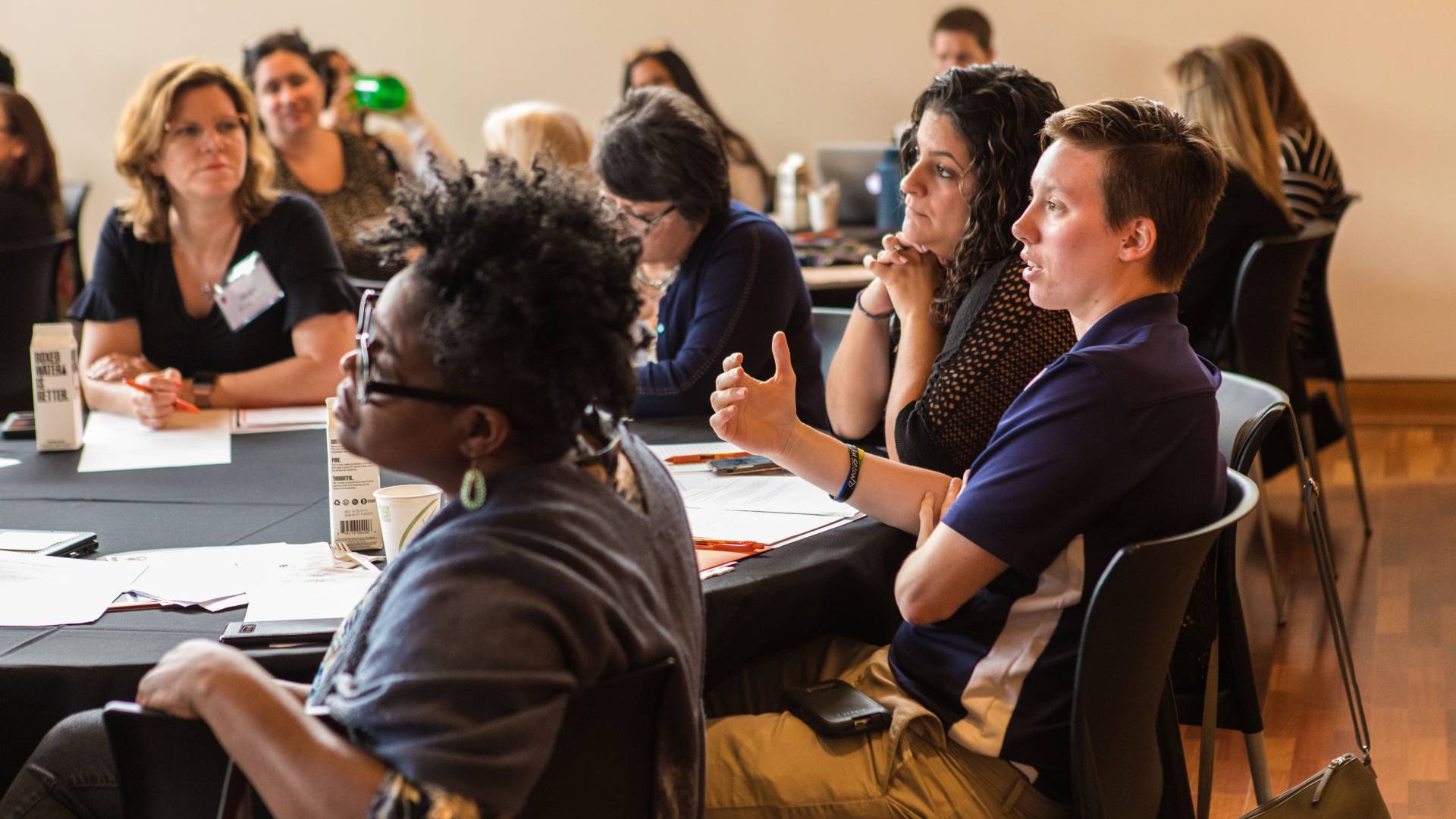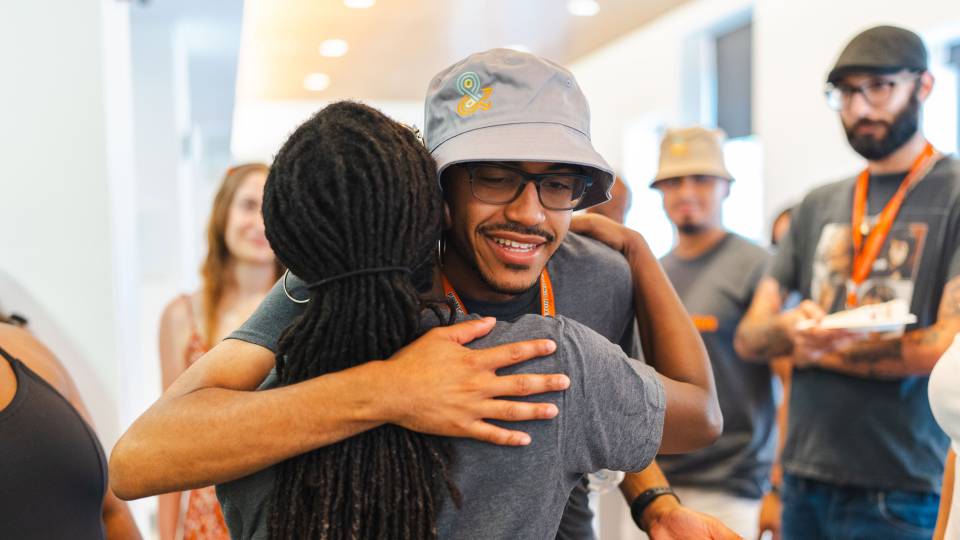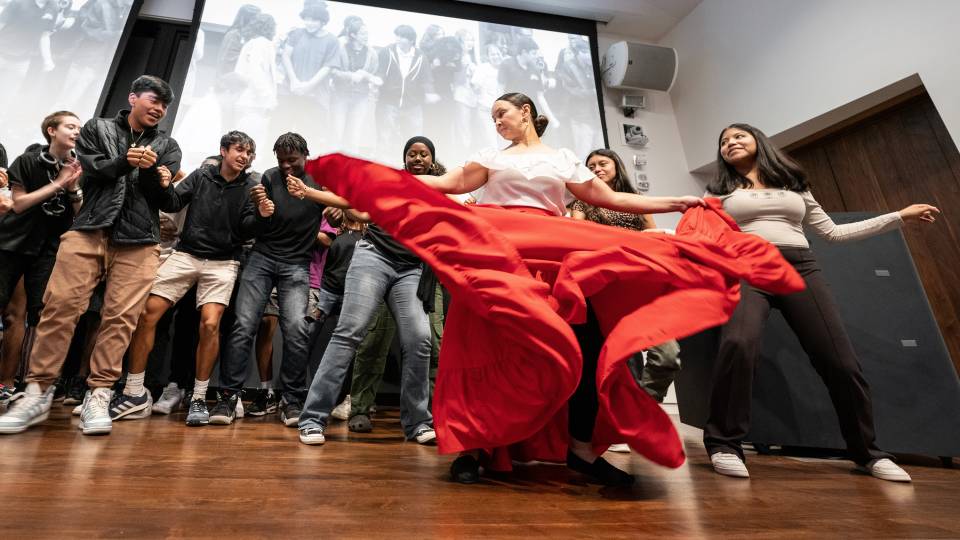Educators from across New Jersey attended Princeton University’s AP/IB Pathways Institute on June 7 to learn how best to support college-bound students from underrepresented backgrounds.
New Jersey high school educators hoping to improve college access for their students spent a day learning about Princeton University’s pathway programs for underrepresented populations at the Princeton AP/IB College Pathways Institute. The educators explored model practices they can apply in their home districts to support students who take Advanced Placement (AP) courses or those who are earning International Baccalaureate (IB) diplomas.
A group of about 80 New Jersey school supervisors, counselors and teachers attended the program, held June 7 at the Carl A. Fields Center for Equality and Cultural Understanding, giving them an opportunity to hear from Princeton faculty, administrators and students about initiatives such as the Princeton University Preparatory Program(Link is external) (PUPP), Freshman Scholars Institute(Link is external) (FSI) and Summer Journalism Program(Link is external) — all of which help high-achieving students from diverse backgrounds to succeed as undergraduates.
“The institute offered an opportunity to bridge the gap between how committed, talented teachers, counselors and administrators prepare students for college and the unspoken academic and social preparation — often referred to as social and cultural capital — colleges and universities expect for student success,” said Kevin Hudson(Link is external), assistant director for college opportunity in the Office of the Provost(Link is external).

Kevin Hudson, assistant director for college opportunity in the Office of the Provost, leads the day’s events, which included presentations from education experts, low-income and first-generation college students, and Princeton staff members involved in the University’s access and inclusion programs.
The morning opened with a statistical overview of student access to high school AP and IB programs presented by Awilda Rodriguez, an assistant professor in the Center for the Study of Higher and Postsecondary Education at the University of Michigan, and a discussion of research showing that many black and Latino students opt out of AP classes regardless of their academic ability. Rodriguez graduated from Princeton in 2003 and was a FSI participant.
Attendees also heard from staff members of Princeton’s access and inclusion programs, who shared best practices for transitioning students from their high school classrooms to college seminars.
“Teachers and counselors, along with trusted guardians and family members, are key influencers of students as they navigate the college process,” Hudson said. “Teachers can especially share aspirational and concrete messaging to students every day. It is important that all student influencers are informed about college pathways in general, and as two of the most common paths of in-school rigor, AP and IB teachers play a critical role in encouraging talented, motivated students to consider highly selective colleges and universities.”

As part of a student panel, Jesse Amankwaah, a 2017 graduate of Ewing High School and the Princeton University Preparatory Program, talks about his experiences applying to college. As a high school student, he was unaware that he would pay less to attend the University of Richmond, where he is currently enrolled, than a community college.
Erin Vearncombe(Link is external), a lecturer in the Princeton Writing Program(Link is external), presented a lesson she uses with FSI students in her “Ways of Knowing” class to help them understand how knowledge is produced and to prepare them to make the most of their own learning.
“Much like we do with our students, I’m going to throw you right into things,” she told the group, as she handed out a reading and exercise. “I’m hoping you will have a good idea of the activities and strategies we use to engage our student learners.”
Keith Shaw(Link is external), director of transfer, veteran and non-traditional student programs in the Office of the Dean of the College(Link is external), spoke about the challenges facing underrepresented student populations when they arrive on campus. He highlighted the importance of learning about the resources and networks to thrive at Princeton.
“The cohort of students facing these challenges is growing, and we have a responsibility to do something about it,” he said.
Later in the day, educators heard directly from first-generation, low-income students, many of whom have participated in PUPP. PUPP partners with six high schools in Mercer County, identifying students in ninth grade who can benefit from academic enrichment throughout high school and support during the college admissions process.
Some of the students spoke candidly about having parents who didn’t speak English and could not assist them with college applications. Others shared how they were directed toward community college or the military by their high school guidance counselors, not having any knowledge of the financial resources available to them when applying to selective institutions.
Russell Cisney-Stackhouse, who graduated with PUPP’s 2017 cohort and now attends Yale University, said the counseling he received through PUPP expanded his vision of what was possible after high school.
“I realized the types of colleges and schools I could go to was much more extensive than I thought,” he said.

Erin Vearncombe, a lecturer in the Princeton Writing Program, shares a sample lesson from her “Ways of Knowing” class, which she leads each summer during Princeton’s Freshman Scholars Institute. “Ways of Knowing” introduces students to how knowledge is produced and prepares them to take charge of their own learning.
The educators in attendance — all of whom work with first-generation, low-income and racially diverse students — said they learned a lot about how to promote self-confidence in their students and about the importance of teaching students to self-advocate.
Wachera Brown, principal of Innovation High School in Jersey City, said she gained insight into the expectations for underrepresented students who apply to Princeton and other top universities.
“It’s important for us to understand what the possible barriers might be so we can develop support for our students,” she said.
Sydney Bleach, an AP Environmental Science teacher at New Brunswick High School, said she gleaned ideas about encouraging students to take more challenging courses and to get on a college track.
The most surprising takeaway for her was learning about the amount of financial aid available to students who apply to selective schools. “If I didn’t know that, I’m sure my students didn’t know that,” Bleach said. “I’m hoping it leads to more students applying to more schools.”
Michael Dillon, IB coordinator for Freehold Regional High School District, said hearing from PUPP participants and learning about their struggles was eye-opening, especially in understanding why students might not feel they had a chance at making it into a highly selective college. “They were honest and brave talking about the struggles they faced, the isolation they felt,” he said. “We don’t want our kids feeling that way.”
Dillon said he’s interested in creating a program similar to FSI to prepare his school’s ninth graders for IB classes in their junior and senior years. “We want to catch those kids and support them and make sure they’re on a path to success in AP and IB,” he said. “It’s always been a focus of ours to remove barriers.”







